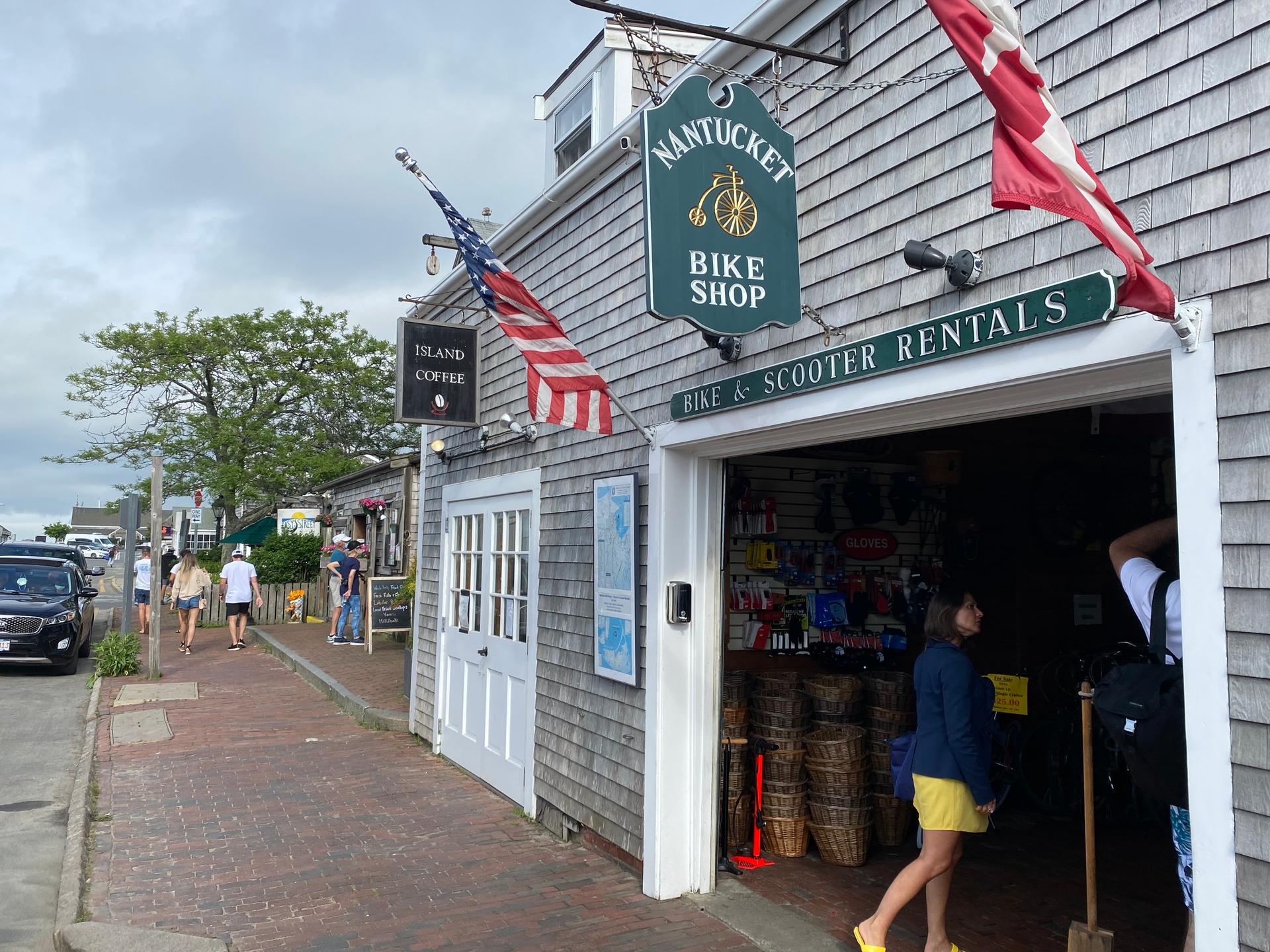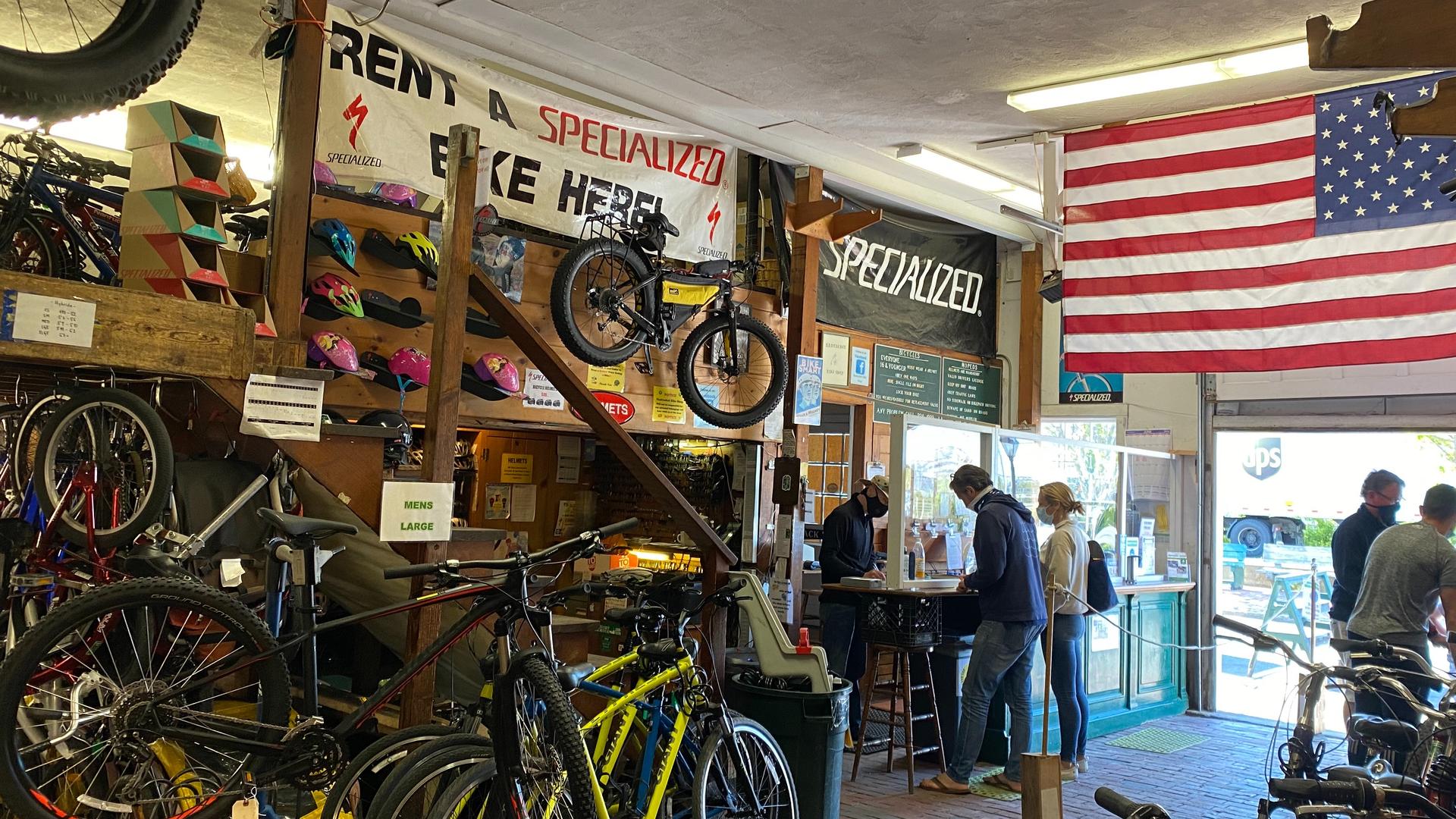Nantucket businesses struggle without seasonal summer workers
The Nantucket Bike Shop usually hires foreign students through the J-1 visa program, but this year the visa program was suspended and foreign workers could not travel to the US to work during Nantucket’s high season. Photo taken on July 2, 2020, Nantucket island, Massachusetts.
It’s mid-June and already 100 degrees just outside of Zagreb, the capital of Croatia. Jakob Gregurić is at home near the base of Mt. Medvednica, a nature park in central Croatia. Gregurić, a 24-year-old student at the University of Zagreb, wrapped up his classes several weeks ago. Most of his friends are working summer jobs they lined up months ago, but Gregurić is still looking.
He was supposed to work on Nantucket island, a resort community off the coast of Massachusetts. Then, the pandemic hit. Visa processing came to a halt. And last month, the Trump administration further suspended many guest-worker visas like the J-1 visa Gregurić got last year.
Related: Trump’s visa ban has technology companies worried
“We had no news for months and months because you would have [had] your visa in like February or March and it’s June. And I still haven’t my visa. … So, we were kind of prepared for it …”
“We had no news for months and months because you would have [had] your visa in like February or March and it’s June. And I still haven’t my visa,” Gregurić said. “So, we were kind of prepared for it. Something’s going to happen. I mean, we are still sad. It’s a great experience.”
In Nantucket, the population usually balloons with tourists during the summer. And the tourists are arriving. Yet, foreign seasonal workers who typically arrive from all over the world to help out during the high season are missing.
Normally, about 100,000 J-1 temporary visas are issued every year to international college students who work at tourist spots ranging from Disneyland to Park City Ski resort to Nantucket. The visa suspensions are part of the White House’s response to job losses because of the coronavirus pandemic.
Related: US seafood workers fight unsafe job conditions amid pandemic
Last year, Gregurić hustled in Nantucket. His main job was at The Nantucket Bike Shop, but he had time left over.
“At first, I thought I would do the bike shop work and then I would probably get a second job, but I wouldn’t … work all day and night,” said Gregurić. “But when I met the guys there and everybody was working, I didn’t have anything to do. So, I found myself a second and third job.”
He brought $8,000 back home. This summer, he says he doesn’t expect to make more than $2,000 in Croatia. He says he’ll miss the cash and also the chance to practice his English and gain work experience in the US.
Four thousand miles away on Nantucket, Gregurić’s former boss at the bike shop, Joe Conway, says he misses the young Croatian. But — so far — he’s managing.
“For the moment, business is slow, so it’s working out so far. … We will see how it handles with the busyness that we’ve got coming … reservations are through the roof.”
“For the moment, business is slow, so it’s working out so far,” said Conway. “We will see how it handles with the busyness that we’ve got coming … reservations are through the roof.”

Conway has 15 employees this summer, down from his usual 30 to 35 — normally including many foreigners on J-1 visas. He’s concerned that business will pick up and he’ll be shorthanded.
For years, Nantucket’s economy has relied on J-1 student labor for the high season. Decades ago, before the visas ramped up, US college students did a lot of the summer work. But — at least in Nantucket — the tourist season expanded into October. US students typically return to school in August. Foreign students, though, can often stay into the fall.
But there’s another reason that Conway prefers J-1 employees.
“They are very hard workers. They do pay attention. They listen to you,” Conway said. “It’s just been amazing, the work they do. And I’ve had a lot of students come back … and they just want to work.”
For now, Conway has hired high schoolers and a few college kids to fill his bike shop needs. The Trump administration says its decision to suspend many of the temporary work visas is about helping people in the US who have lost their jobs. But Conway is not so sure about this because he hears otherwise from people he spoke to when he offered them seasonal work.
“They tell me, ‘Well no, I’m not going to work for $15 an hour when I’m sitting at home collecting $25 an hour [of unemployment].’ I can’t say I blame them,” Conway said.
Related: International students are in coronavirus limbo. So are universities.
Businesses all over the island are feeling the labor supply squeeze. Kristie Ferrantella is the head of Nantucket’s Chamber of Commerce.
“I think a lot of businesses are going to really struggle this year. … I was with a restaurant owner this past week who typically employs 90 people in the summer and this year she’s going to be doing it with 26.”
“I think a lot of businesses are going to really struggle this year,” Ferrantella said. “I was with a restaurant owner this past week who typically employs 90 people in the summer and this year she’s going to be doing it with 26.”
This scenario is now happening nationwide. The executive order by the Trump administration to suspend foreign worker visas until the end of 2020 is supposed to be in the interests of US workers. But David Bier, an immigration policy analyst at the CATO Institute, says that the move will do the opposite.
“Tens of thousands of businesses across the US…need workers,” Bier said. “This order is going to disrupt that, ultimately delaying the recovery and causing more economic hardship.”
The extent of this disruption — on Nantucket Island, at least — depends on how business goes during this highly unusual summer and fall. Nantucket will definitely miss the injection of international cultures, languages and the positive spirit that these young foreigners bring with them.
